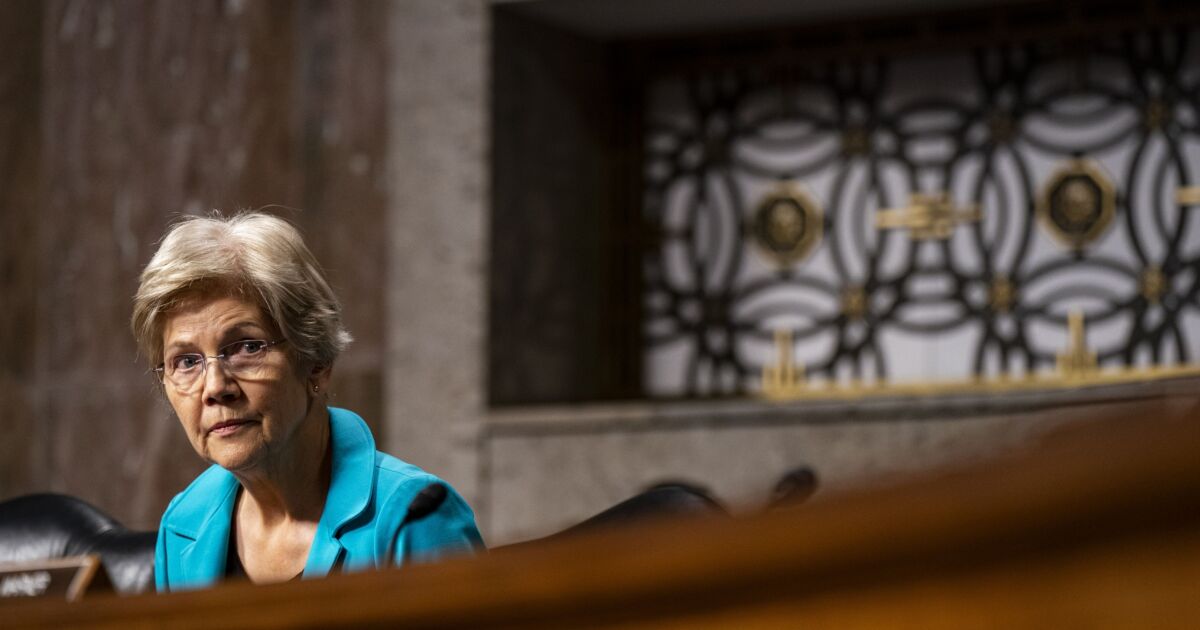
- What's at Stake: A three-judge panel already ruled in August that the Trump administration can fire up to 1,500 employees of the CFPB.
- Forward Look: Allowing the Trump administration to dismantle the agency would represent "a blatant disregard for Congress's constitutional role," Democrats claim.
- Expert Quote: "Only Congress has the power to shutter the CFPB," Democratic lawmakers state.
Democratic lawmakers are asking a federal appeals court to hear a case about the Trump administration's efforts to fire most of the employees at the Consumer Financial Protection Bureau, arguing his attempt to shutter the agency is unconstitutional.
"A President, of course, may disagree with Congress's choice," the lawmakers said in an
The brief was signed by 36 Democratic lawmakers led by House Financial Services Committee ranking member Rep. Maxine Waters, D-Calif., Senate Minority leader Chuck Schumer, D-N.Y., and Senate Banking Committee ranking member Elizabeth Warren, D-Mass.
The lawmakers asked the full D.C. Circuit to rehear the case filed by the National Treasury Employees Union against acting CFPB Director Russell Vought. The brief was jointly written by Hannah M. Kieschnick, a senior attorney at Public Justice, a nonprofit advocacy group and Leah M. Nicholls, director of Public Justice's Access to Justice project.
Separately, the Constitutional Accountability Center, a think tank and public interest law firm, also filed an amicus brief in support of the CFPB's union, calling it an "archetypal separation-of-powers case."
Brianne J. Gorod, the Accountability Center's chief counsel, argued that abolishing a federal agency violates the Constitution's separation of powers because Congress has exclusive authority to eliminate a federal agency.
"Because federal agencies are 'creatures of statute,' … it takes an act of law to create, restructure, or abolish an agency. In that lawmaking process, Congress is supreme," Gorod wrote.
In August, a
By a 2-1 vote, the panel held that Vought's effort to conduct RIFs did not constitute a final agency action — or even a policy — and, therefore, was not reviewable by the courts under the Administrative Procedure Act. The panel of two Trump-appointed judges sided with the Trump administration while one Obama-appointed judge dissented.
"Absent a preliminary injunction, Defendants will implement their decision to eliminate the CFPB. Allowing Defendants to do so would represent a blatant disregard for Congress's constitutional role and threaten the consumers the CFPB was created to protect — and has protected since its creation a decade and a half ago," the lawmakers' brief said.
The lawmakers argue that the full D.C. Circuit needs to hear the case "en banc," because of the separation of powers issues.
"If the majority's opinion is left to stand, courts in this Circuit will thus be "powerless" to stop a President from acting with impunity and dismantling any statutorily-created agency — or ignoring any statute he so chooses," the brief states. "That result simply "cannot be reconciled with either the constitutional separation of powers or our nation's commitment to a government of laws. En banc review is urgently needed to avoid such an outcome."
Congress created the CFPB in response to the 2008 financial crisis that required massive government intervention given that nearly 500 banks failed at a cost of roughly $73 billion to the Federal Deposit Insurance Corp.'s insurance fund, the brief states.
Before the Dodd-Frank Act of 2010 led to the creation of the CFPB, 18 consumer financial protection laws were scattered across several agencies. Title X of Dodd-Frank transferred the oversight authority of those laws to the CFPB and gave the agency broad rule-making authority and the ability to issue regulations identifying as unlawful "unfair, deceptive, or abusive acts or practices" related to consumer financial products or services. The CFPB also has exclusive authority to supervise large banks.
The lawmakers claim that reducing the workforce at an agency to such an extreme degree is effectively the same as eliminating the agency, which the president does not have the power to do.
"Only Congress has the power to shutter the CFPB," the brief states, adding that when "Congress has enacted a statute, as it did with Dodd-Frank, 'no provision in the Constitution authorizes the President to enact, to amend, or to repeal' it.
"There is no general authorization to restructure the executive branch, including by dissolving a statutorily-created agency," the brief continued. "Nor does Dodd-Frank delegate to the President the authority to dismantle the CFPB. Rather, the Act vests in Congress substantial oversight over the Bureau."
The lawmakers' brief cites the 1952 case of Youngstown Sheet & Tube Co. v. Sawyer, a landmark Supreme Court decision that limited the power of the president and has served as a check on far-reaching claims of executive power.
"The President must participate in the political process and adhere to the Constitution's structure, not ignore it," the brief states. "The country's history includes numerous examples of the branches working together to eliminate statutorily-created agencies."
"And, even while amending the CFPB's governing statutes, Congress has rejected efforts to eliminate the Bureau wholesale," the brief states.
Gorod at the Constitutional Accountability Center argues that the D.C. Circuit panel's majority erred through a "fundamental misunderstanding" of the Supreme Court's decision in Dalton v. Specter about the separation of powers.
"Indeed, Dalton makes clear that some executive actions taken without statutory authority do give rise to actionable constitutional claims," the brief states. "Plaintiffs may bring constitutional claims whenever the President 'act[s] in violation of the Constitution,' ... such as when he exercises a power not delegated to him, ... including those expressly delegated to other branches."
"At no point has Congress authorized the President to abolish the CFPB, and Defendants do not even purport to claim otherwise," she wrote.
"Past Presidents seeking to eliminate executive departments or agencies have recognized that Congress retains that ultimate authority," she wrote. "In fact, whenever past Presidents have reorganized the executive branch, they have always done so pursuant to express congressional delegations of that power."



